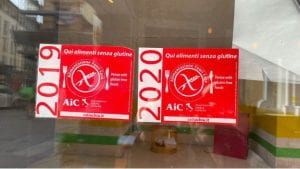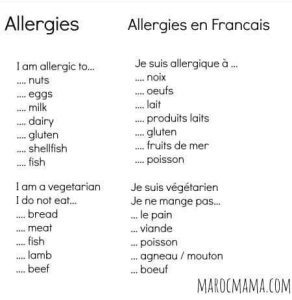One of the apparent obstacles that students often face when studying abroad is the presence of food allergies. Today we are sharing our peer advisor, Grace Moore’s experience while studying abroad with a food allergy and how it might not have affected her experience as much as she thought it would.

Having allergies is difficult enough at home, so you may think that studying abroad with them would be impossible. I certainly did. Before I studied abroad in Venice, I felt that I wouldn’t be able to find any gluten-free food, because I was only thinking about the stereotypical Italian foods of pizza and pasta. However, I was pleasantly surprised to find that I had many more options than I ever thought I would. With a little bit of planning and research, you can enjoy your study abroad experience to the fullest without your allergies holding you back.
Research
Doing a little bit of research before you depart will make finding food much easier after you arrive.
- Leverage Social Media: Social media (such as Instagram, YouTube, and TikTok) are great resources for finding restaurants in the area you’ll be traveling to that can accommodate your needs.
- Explore Travel Blogs: A quick Google search can give you blogs with information to help you plan your culinary adventures. Ex. Google “gluten-free travel blog”
Because I researched gluten-free options in Venice before I went there, I was able to begin my program with a list of restaurants, and even a gluten-free supermarket within walking distance of my dorm.
Gluten-free restaurant certifications in Italy and Spain:


Effective Communication
If you’re studying abroad in a country in which English is not the common language, you should make sure you know how to describe your dietary needs in the language of that country.
- Learn Key Phrases: Familiarizing yourself with the words for the foods you do not eat and your allergies/conditions will make communication easier. Often if you’re in a restaurant and don’t know if there is food you can eat there, you can tell a staff member about your allergies, and they’ll help you.
- Allergy Cards: It can also be helpful to carry an allergy card with you while you’re abroad. This card can contain a brief description of what you’re allergic to (in the language of the country you’ll be in) and can even include pictures of what you’re allergic to. These cards can be a lifesaver when explaining your dietary needs in a restaurant or market.
You can download or buy premade cards in many different languages for a variety of allergies and diets:
Example allergen card and list of useful phrases:


Ask the experts
Tap into Faculty Expertise: If you’re going on a faculty-led program, reach out to that faculty member before you leave to see if they have any advice specific to your destination. This will also help them ensure that there is accommodation available in the various places you will travel to as a group.
Professors at your university abroad know the area better than anyone, and they will likely have advice and restaurant recommendations. They can help you learn the correct phrases to describe your allergies.
Connect with Locals: If you know the language of the area well enough to speak it with locals, you can ask people you meet for recommendations. I visited a gluten-free supermarket in Venice and was able to ask the shop owner to recommend some restaurants that accommodate gluten allergies.
Be Prepared
Ideally, you will have no issues studying abroad with allergies. However, it is always a smart idea to be prepared for the worst.
- Emergency Medication: Always carry your emergency medication. This could be an epi-pen, Benadryl, or whatever your doctor has instructed you to take in case of an emergency.
- Stock up on snacks: Pack snacks for those unexpected hunger pangs or long journeys. You never know where you might find yourself when you study abroad. While sightseeing, you may get hungry and realize that there are no restaurants nearby that serve food that is safe for you to eat. Or you may take a long train ride to another city and need to eat while you’re traveling. I recommend going to a supermarket soon after arriving in your country of destination to stock up.
When my program group took a weekend trip to Florence, I was so glad that I had thought ahead and packed some gluten-free food in my bag. Our hotel provided breakfast, and while there were some foods available that were safe for me, I was thankful that I had brought a bag of gluten-free pastries with me to eat as well.
Enjoy Yourself
In the end, don’t let allergies deter you from the life-changing experience of studying abroad. With a bit of research and preparation, you can enjoy your time abroad and the food your destination has to offer. You may be surprised by how many options you have.
